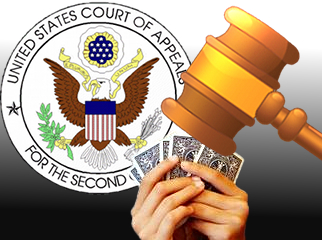 A US federal appeals court has reversed a lower court ruling that allowed poker advocates to claim their game of choice was predominantly a game of skill. In August 2012, US District Court for the Eastern District of New York Judge Jack Weinstein vacated a guilty verdict against Lawrence DiCristina, whose hosting of real-money live poker games in a Brooklyn warehouse had led to his being charged with operating an illegal gambling business under the federal Illegal Gambling Business Act (IGBA) of 1970.
A US federal appeals court has reversed a lower court ruling that allowed poker advocates to claim their game of choice was predominantly a game of skill. In August 2012, US District Court for the Eastern District of New York Judge Jack Weinstein vacated a guilty verdict against Lawrence DiCristina, whose hosting of real-money live poker games in a Brooklyn warehouse had led to his being charged with operating an illegal gambling business under the federal Illegal Gambling Business Act (IGBA) of 1970.
In his 2012 ruling, Weinstein said both DiCristina and federal prosecutors had made a compelling case as to whether poker did or didn’t qualify as gambling under the IGBA due to its alleged reliance on skill compared with more traditional house-backed games of chance. As a result, Weinstein decided to apply the defendant-favoring ‘rule of lenity,’ which led DiCristina skate. The feds vowed to challenge Weinstein’s ruling, and oral arguments in their appeal were heard on June 19 in the US Court of Appeals, Second Circuit.
In Tuesday’s 23-page ruling (read it here), the panel of appeal judges stated that DiCristina’s operation had satisfied all three criteria for meeting the definition of an “illegal gambling business” under IGBA: it was operating in violation of New York State law, its smooth running required the attention of five or more persons, and it had taken in over $2k in revenue on any given day of operation or had been in substantially continuous operation for longer than 30 days. Since those criteria had been met, the panel ordered DiCristina’s original guilty verdict reinstated and sentencing to proceed.
SKILL V. LUCK V. REALITY
Beyond the fate of poor Lawrence, the panel said it had failed to find the ambiguity regarding poker that Weinstein had identified in the IGBA. The failure to locate this alleged ambiguity left the panel no alternative but to “decline to limit the statute’s reach beyond its plain terms.” The panel went on to quote verbal exchanges between Congressional reps back when IGBA was still being debated that suggested poker was indeed meant to be included under IGBA’s scope.
The panel went on to say that the IGBA’s “clear and unambiguous text” had demonstrated Congress’ “unmistakable purpose” in enacting the legislation. “The IGBA was driven by concerns about the revenue generated by large scale gambling business rather than the games that were played.” As such, the panel determined that the skill v. luck question was “inapposite to this appeal.”
The Poker Players Alliance has seized on the panel having failed to make a categorical statement on the skill v. luck argument. The PPA issued a statement saying that while it found the ruling “unfortunate,” the panel “clearly did not dispute the district court’s finding that poker is a game of skill.” The PPA says it “stands ready to support Mr. DiCristina should he choose to appeal this decision.”
Of course, there are those who have long argued that the skill v. luck argument as applied to poker is nonsensical. Others, including the man whose name this site bears, have argued that successful sports betting requires just as much mental prowess as any card game (which is why Billy Walters needs ‘beards’ in order to place his wagers at Nevada sportsbooks).
Weinstein’s ruling had been championed by a range of online poker advocates, including former Full Tilt Poker director Howard Lederer, who thought it might help resolve his Black Friday legal woes, as well as federal politicians looking to legalize online poker while keeping all other forms of online wagering safely locked inside Pandora’s box. Tuesday’s ruling will provide online poker opponents a ready and effective counter to these advocates’ arguments, making the likelihood of federal online poker legislation even more of an uphill slog.
